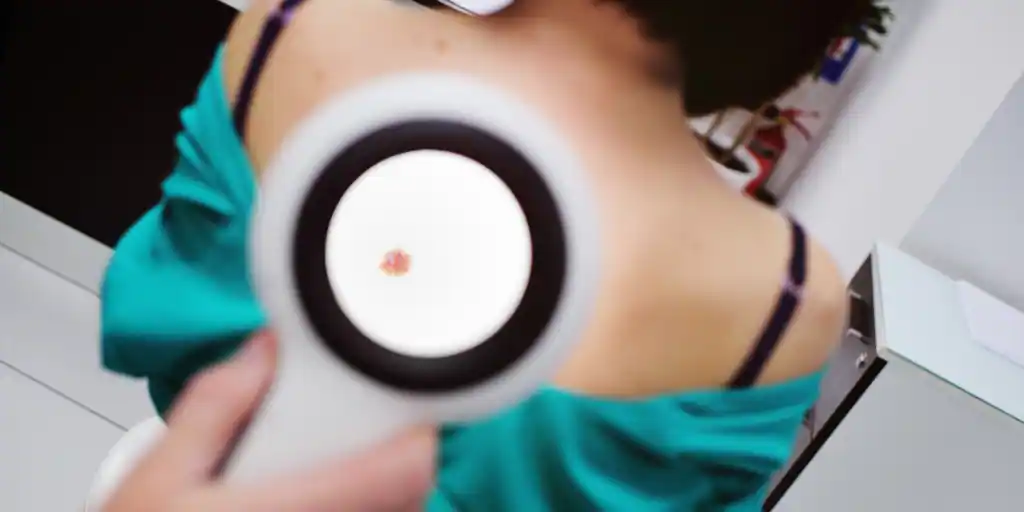Delays in diagnosing skin cancer during imprisonment meant the loss of more than 100,000 years of life in Europe.

Delays in melanoma diagnosis due to Covid-19 lockdown may have resulted in more than 100,000 life years lost in Europe and costs of more than £6 billion (7,014 million euros), mostly indirectly through lost productivity, according to a new study conducted by researchers at University College London (UCL) in the UK and University Hospital Basel (Switzerland).
The authors of the new JAMA Network Open paper say their findings show how important early detection of cancer can be, while highlighting the importance of considering unwanted side effects in any future pandemic planning.
“When quarantine was introduced as a desperately necessary measure to stop the spread of Covid-19, There were significant unintended consequences. Many tests were canceled and treatments were delayed,” says Dr Kaustubh Adhikari from UCL’s Department of Genetics and co-author of the study.
Economic impact
“Because many people have missed appointments for skin cancer screening or treatment, their cancer has progressed to an advanced stage, resulting in more expensive treatment and a higher risk of treatment failure. It is alarming that many years of life have been lost, the quality of life of many thousands of people has been reduced and billions of pounds of economic damage have been lost due to a single disease; maybe this is just the tip of the iceberg about the consequences of delaying diagnosis and treatment of the disease due to restrictions,” he adds.
While the lockdown has saved many lives by mitigating the impact of Covid-19 itself, he says: “It is important that we learn from experience to ensure that If another pandemic occurs, we can effectively balance different priorities. medical assistance.”
A team of researchers from the UK, Switzerland, Germany, US, Italy, Australia and Hungary studied the health economic impact of delays in diagnosis of melanoma, a common type of skin cancer, one of the 10 most common cancers in Europe. The analysis was based on information from 50,072 patients from two cancer centers in Switzerland and Italy, as well as additional data from the UK and Belgium.
The researchers calculated how many people’s cancer might have progressed from one stage to another due to delays in starting or continuing treatment, as both screening services and treatment were interrupted in 2020 and 2021 due to lockdown restrictions, staff shortages and fear of infection. They calculated that In about 17% of people with melanoma, the cancer will progress. to a higher stage in 2020-2021. due to a delay in diagnosis or treatment of two to three months or more.
The research team then estimated additional medical costs because treating advanced cancer is more expensive and less likely to succeed. These cost estimates included both direct costs to health care providers (such as the National Health Service) and wider impacts such as lost productivity (indirect costs) due to disability and years of life lost.
“In both normal times and times of crisis, preventative healthcare should always be a priority,” the study authors said.
Researchers estimate that delays in melanoma diagnosis resulted in 111,464 years of life lost in 31 European countries, with a total economic loss of £6.1 billion (€7.1 billion or US$7.7 billion). The majority of the costs (94.5%) were indirect costs, such as lost productivity.
“Our results show that Preventative medicine should always be a top priority, both in normal times and during times of crisis; “Any plan for possible future pandemics must take into account unwanted side effects on a wide range of health conditions and plan comprehensively,” says co-author Dr. Elisabeth Reuder from the University Hospital Basel.
Delays ‘could have devastating consequences’
“Delays in diagnosis and treatment They can be destructive for people affected by cancer, so timely screening and treatment is vital for people concerned about their health, while health system leaders should consider screening programs a priority,” he adds.
The study was supported by the University of Basel Research Foundation, the ProPatient Foundation, the University of Basel, the Goldschmidt Jacobson Foundation and the Swiss National Science Foundation.